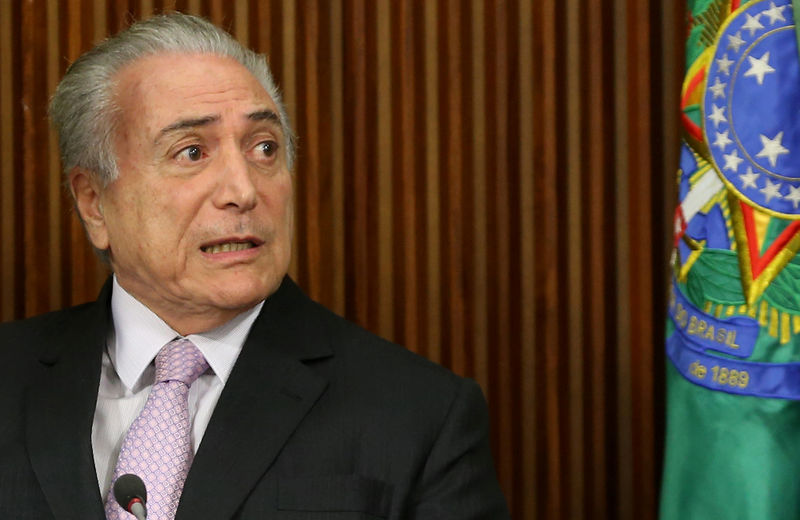By Paulo Prada
RIO DE JANEIRO (Reuters) - When Michel Temer took over Brazil's presidency in May, many hoped he could overcome the political gridlock, corruption scandals and economic obstacles that have hobbled Latin America's biggest country.
But seven months into the job, Brazil's problems look just as intractable as they did when Temer and his Congressional allies orchestrated the impeachment of Dilma Rousseff, his predecessor.
Like a sequel to her administration, Temer's is already beset by scandal, an unwieldy legislature and an economy that risks entering a third year of recession.
Instead of hope and change, after 13 years of increasingly feckless government by the leftist Workers Party, even those who enabled Temer's ascent fear more of the same.
"We already have a crisis of confidence as bad as it was with Dilma," says Cristovam Buarque, a veteran senator scorned by fellow leftists for supporting Rousseff's impeachment. "There is no indication the country has a way out of this mess."
A quick fix would be rare in Brazil's chaotic, multiparty democracy.
After all, Temer, as vice president, was part of Rousseff's administration and, critics say, helped create the mess. His Brazilian Democratic Movement Party (PMDB), a shapeshifting mix of conservatives and pork-barrel centrists, was a key part of the Workers Party coalition.
And Temer, a backroom dealmaker who calls his specialty "arbitrating conflict," is not the commandeering, inspirational savior that many Brazilians crave.
"This is someone known for accommodation, not for leading with ideas, certainty and strength," says Rafael Cortez, a political scientist at Tendencias, a São Paulo consulting firm.
The president and his aides say they remain confident they can pull Brazil from the morass. But many Brazilians are growing impatient, with memories fresh of an economic boom that preceded the Rousseff administration.
The recession is proving relentless, pushing unemployment toward a 12 percent level unseen in over a decade.
Last week, government data showed the economy contracted for a seventh consecutive quarter. Confidence is so low – and wallets so bare – that businesses are not investing and consumers are not spending.
If federal finances were not hurting enough, with the deficit this year expected to equal 10 percent of the economy as tax revenues plummet, Temer recently agreed to help troubled state governments. Several states are so bankrupt they will likely need full-fledged bailouts.
FISCAL CRISIS, MESSY POLITICS
To make way for future growth, Temer has bet on two measures economists have long argued would make Brazil more efficient: a constitutional amendment to limit government spending and an overhaul of the costly social security system.
Even if they are passed quickly - which is far from certain amid political tumult that threatens to derail a Senate vote on the spending cap - the measures will provide little immediate relief.
"There is a horrendous fiscal crisis ahead and the government has only been thinking about the medium- and the long-term," says Monica de Bolle, a Brazilian economist at the Peterson Institute for International Economics.
She is one of a few to have suggested Temer consider tapping the International Monetary Fund – anathema to some in a country that during the boom took pride in weaning itself off decades of foreign assistance.
"The government is going to need cash and it doesn't make sense to just sit, wait and hope," de Bolle added.
The messy political situation is compounded by growing tension between the executive, legislative and judicial branches. Temer recently lost his fourth minister to graft allegations.
On Monday, a Supreme Court judge sought to strip the Senate presidency from Renan Calheiros, a party colleague of Temer's, after indicting him on corruption charges. On Tuesday, Calheiros said he would resist the order.
If the full court forces his removal, Calheiros' replacement, a Workers Party stalwart, is expected to delay the spending-cap vote.
The lower house, rattled by a plea bargain deal by employees of engineering firm Odebrecht SA that could implicate dozens of lawmakers in a kickback scandal, disgusted Brazil last week by passing a bill meant to intimidate judges and prosecutors.
Combined, the troubles have undermined confidence further.
Local stocks and Brazil's currency, the real, are trading well below peaks reached after a post-impeachment boom.
The Eurasia Group, a political risk consultancy, on Monday raised its probability to 20 percent that Temer would not finish his term, citing growing unrest and possible fallout from the kickback probe, which could touch Temer himself.
Having gone through one traumatic ouster, few Brazilians are eager for another aborted administration. Even if Temer is unpopular, with approval ratings mired at around 14 percent, some see no benefit in his failure.
"We have to hope for improvement," says Rogerio Chequer, a São Paulo businessman who leads Vem Pra Rua, a conservative group that organized street protests in recent years. "We need economic development, we need better politics and we need a way out of this deadlock."
